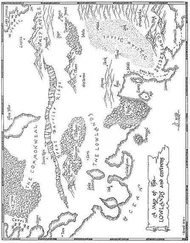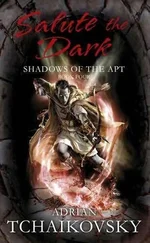Adrian Tchaikovsky - Heirs of the Blade
Здесь есть возможность читать онлайн «Adrian Tchaikovsky - Heirs of the Blade» весь текст электронной книги совершенно бесплатно (целиком полную версию без сокращений). В некоторых случаях можно слушать аудио, скачать через торрент в формате fb2 и присутствует краткое содержание. Жанр: Фэнтези, на английском языке. Описание произведения, (предисловие) а так же отзывы посетителей доступны на портале библиотеки ЛибКат.
- Название:Heirs of the Blade
- Автор:
- Жанр:
- Год:неизвестен
- ISBN:нет данных
- Рейтинг книги:4 / 5. Голосов: 1
-
Избранное:Добавить в избранное
- Отзывы:
-
Ваша оценка:
- 80
- 1
- 2
- 3
- 4
- 5
Heirs of the Blade: краткое содержание, описание и аннотация
Предлагаем к чтению аннотацию, описание, краткое содержание или предисловие (зависит от того, что написал сам автор книги «Heirs of the Blade»). Если вы не нашли необходимую информацию о книге — напишите в комментариях, мы постараемся отыскать её.
Heirs of the Blade — читать онлайн бесплатно полную книгу (весь текст) целиком
Ниже представлен текст книги, разбитый по страницам. Система сохранения места последней прочитанной страницы, позволяет с удобством читать онлайн бесплатно книгу «Heirs of the Blade», без необходимости каждый раз заново искать на чём Вы остановились. Поставьте закладку, и сможете в любой момент перейти на страницу, на которой закончили чтение.
Интервал:
Закладка:
He had taken his men to ground after that, let them enjoy the meagre spoils in the heart of a small wood while he planned his next move.
It reminded him of the way it had been after the war. The Wasps had changed his life, but he could not say whether that was for the better or not. Before the war he had been a woodsman, hunting and tracking game to keep his village fed, spending his days out of doors and his nights in a variety of beds – a loner, but not an outsider, and with more than a few admirers. It was a better living than many enjoyed, surely. The village headman had not bothered him, and the nearest noble had barely troubled the headman. It was a way of life that had been turning its slow circles for ever, and could have done so for ever more – or so it seemed to all concerned.
Then the Wasp Empire had mounted its grand invasion – a people and a nation that nobody in Dal Arche’s village had ever heard of, and originating so many miles away it might have been something out of a folk tale – until, that is, the prince’s recruiters came. There was to be a levy, and the headman had been given a quota: young men and women to be sent off to the war.
Some had volunteered, most had been put forward by others or decided by the headman’s fiat. The old man had even sent his own son, acting from faith or guilt. They had been supplied with spears and padded cuirasses, and Dal had brought along his little woodsman’s bow. And so they had gone to war.
Of those young men and women conscripted into the Commonweal’s grand army from Dal’s village, only Dal himself survived. The others had died, almost all together, charging the Wasp lines: scorched by stings, lanced by crossbow bolts, butchered by the sword. Only Dal, the archer, had lived, to be taken up by the princes and put into another force. He had been one of several such archers, but he had been a swifter flier and a better shot, and more than that, he had come to understand that few of the nobles directing the battles had the slightest idea of what they were doing. The Wasps had come against them with their flying machines and their automotives, their ordered formations, their ballistae and their stings. In return, the Commonweal had brought its massed ranks of spears, its vast, untrained and frightened peasant levy, within which, studded like gems, were the glittering retinues of individual nobles and princes.
Dal never went home again. He did not want to look into the faces of villagers he had grown up with, and see their eyes accuse him of the crime of being the only man to return. Nor could he go back to being a simple woodsman.
He had sworn that he would never be the subject of princes again.
After the war the Commonweal was a different place. The Monarch’s lands had already possessed their share of vacant provinces, gone to seed without a noble’s ruling hand and becoming a haunt for the lawless and the wild. The war had killed off many of the old families, and at the same time released onto the land far too many men who had known war, and would not take up the plough again.
Dal had thus become a bandit, and a leader of bandits. Then he had been caught, not by some aggrieved prince but by the Empire, near whose borders he had strayed. Escaping eventually from Imperial custody, he and three comrades had tried to make a living by hunting down fugitives, but business had been bad, and princes were poor paymasters. In the end it had been the free outlaw’s life again for Dal.
He remembered Siriell, and how she had been building her own principality in miniature: yoking together violent men like Dal and making them work in partnership, laying the foundations of a community.
So much for that.
A few days ago he had acquired another thirty men, the first batch that Mordrec and the others had recruited, so he had decided it was time to go hunting once more. They had found a barge heading for Leose and captured it – there had been no guards, for word of Dal’s activities was slow in spreading, and there had been little brigandage in these parts for years, thanks to Siriell’s moderating influence. Dal had thought the barge attack had passed without bloodshed, but then the barge’s master, for inexplicable reasons, had attacked one of the brigands as they were exploring the hold. In the fracas that followed, five of the barge’s crew of six had been killed, but Dal shed no tears for them. If it was useful to have a reputation that said those who surrendered would live, it was similarly useful to make it known that those who resisted would die. That was the code of wise robbers by land and sea all over the world. As a compromise, he had let the final bargeman go unharmed, just to spread the tale.
The barge had originally been heading here to Sara Tela, and Dal and a few companions had then seen it to its destination. On arrival the headman had come down to the quay with his servants and household, eager to get the goods unloaded and ready for the tax collectors. Sara Tela was a wretchedly poor place, Dal had noted, the houses small and shabby, the land around it half barren, the fields mean. He had grown up in just such a place, living on land that could barely support the people farming it, let along a hierarchy of increasingly distant nobles.
Even as the man approached, Dal had put an arrow into the headman, before the eyes of his family and followers. Some of the rest had fled, others had tried to fight, but the bandits outnumbered them, and had arrows already nocked. It had been a short and miserable piece of business, and most of the locals had not run, but simply watched, not remotely minded to step in to save their headman or his henchmen, and maybe curious as to what Dal would do next. They had gathered their children close to them and watched. We are poor, their silence seemed to say. Will you take that from us, too?
A ripple had gone through them when Dal had sent his Scorpion lieutenant, Ygor, over to the storehouse to force open the door. Barad Ygor was a showman at heart and, after severing the rope ties with his claws, he had thrown the door wide and stepped back dramatically.
Now Dal Arche’s followers were finishing up their looting, taking everything of value and loading it on the barge, before burning whatever was left behind. Those villagers who had fled would find all the days and months of their lives undone, and perhaps they would starve. Where would they go? Perhaps they would seek solace from their betters, begging at the steps of the nobility whose solemn duty was to provide for them and protect them. Dal did not rate their chances highly, for he had seen the face of the nobility, and by actions such as this he was going to hold a mirror up to it.
See what your rulers truly are, he thought. I have seen, and so shall you.
He would wager that the Salmae would be slow to offer succour to those he was now making homeless, but they would be quick to avenge this slight on their honour and this infringement of their feudal rights, just as they had not been able to leave Siriell’s Town alone and in peace.
Soul Je jogged him with an elbow abruptly. Company was approaching: a party of riders galloping alongside the canal towards the blazing buildings.
Dal squinted, and counted half a dozen. A quick glance at the sky showed no sign of dragonfly-riders up there, nor had there been time for cavalry to come all the way from Leose itself. This must be some band of Mercers who happened to be in the area, perhaps investigating Dal’s earlier misdeeds.
He kicked off from the roof and landed in the village’s heart, surrounded by the collapsing skeletons of houses and a flurry of glowing embers. ‘Get it stowed right away. They’re coming!’ he shouted, and his people, new and old, doubled their pace, practically throwing everything on to the barge. The draught-nymph was already in place ready to drag the bulky craft back the way it had come, though of course the riders could outstrip it easily.
Читать дальшеИнтервал:
Закладка:
Похожие книги на «Heirs of the Blade»
Представляем Вашему вниманию похожие книги на «Heirs of the Blade» списком для выбора. Мы отобрали схожую по названию и смыслу литературу в надежде предоставить читателям больше вариантов отыскать новые, интересные, ещё непрочитанные произведения.
Обсуждение, отзывы о книге «Heirs of the Blade» и просто собственные мнения читателей. Оставьте ваши комментарии, напишите, что Вы думаете о произведении, его смысле или главных героях. Укажите что конкретно понравилось, а что нет, и почему Вы так считаете.












